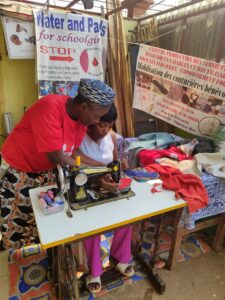The current Egyptian constitution 2014 is de facto a new constitution, while de jure it is as an amendment of the suspended 2012 constitution. It is a progressive constitution which includes 247 articles with 11 additional articles. Regarding the content, there are 42 new articles compared to the previous constitution in addition to a new preamble. The constitution referendum was held on 14–15 January 2014 and it was approved by 98% with significant participation from women.
What is remarkable in this constitution is the emphasis on “citizenship” throughout all articles. The first article in the constitution states: “…a democratic republican system that is based on citizenship and the rule of Law”; which is a restoration of what was in the same article in the amended constitution of 1971, and was dropped in the 2012 constitution after the revolution in which the principle of citizenship was not the base of the Egyptian state system.In line with this principle, article 9; for example, confirms in absolute manner that “The State shall ensure equal opportunities for all citizens without discrimination”. Citizenship includes implicitly the principle of equality; this is identified in the article 53 “All citizens are equal before the Law. They are equal in rights, freedoms and general duties, without discrimination based on religion, belief, gender, origin, race, color, language, disability, social class, political or geographic affiliation or any other reason. Discrimination and incitement of hatred is a crime punished by Law. The State shall take necessary measures for eliminating all forms of discrimination, and the Law shall regulate creating an independent commission for this purpose”.
The word of citizen/citizenship is stated 53 times compared to 28 in the 2012 constitution. Additionally, the preamble stipulates that: “We the citizens, women and men, the Egyptian people, sovereigns in a sovereign homeland, this is the manifestation of our volition, this is the Constitution of our revolution”.
The new constitution affirms on social rights in order to attain a better life for women, it is the first time claims explicitly that “Nationality is a right to anyone born to an Egyptian father or an Egyptian mother, and legal recognition through official papers proving his/her personal data, is a right guaranteed and regulated by Law” (article 6), while in the previous constitutions just mentioned that nationality is a right regulated by law. So it is a progressive article provides safety for women and their children and accordingly the article 10 confirms that “The family is the nucleus of society……. And The State shall ensure its cohesion, stability and the establishment of its values”.
The article 11 could be considered the core of women’s rights in the new constitution as it includes various principles: equality, political rights, protection from all forms of discrimination and motherhood; furthermore, the declaration of the rights of the disadvantaged women such as women breadwinners. The article states “The State shall ensure the achievement of equality between women and men in all civil, political, economic, social, and cultural rights in accordance with the provisions of this Constitution. The State shall take the necessary measures to ensure the appropriate representation of women in the houses of representatives, as specified by Law. The State shall also guarantee women’s right of holding public and senior management offices in the State and their appointment in judicial bodies and authorities without discrimination. The State shall protect women against all forms of violence and ensure enabling women to strike a balance between family duties and work requirements. The State shall provide care for and protection of motherhood and childhood, female heads of families, and elderly and neediest women”.
The Child rights are set clearly in the article 80: “anyone under the age of 18 shall be a child” which is coinciding with international conventions and with the Egyptian law. Therefore child marriage is prohibited not only by law, but by the constitution. Further, the article asserts the rights of identity, health care, safe shelter, education and protection from all forms of violence and compulsory work. Such rights are not guaranteed for healthy children only but also for children with disabilities which reflects the essence of equality principle.
Concerning the political rights, the quota is deleted in principle. It is worth noting that the previous constitutions did not determine certain quota for women in the representative councils; however, they just mentioned that law could determine the minimum amount of seats for women in the councils. What existed before the revolt of 25th of January 2011 was, according to the election law. The current constitution does not refer to any types of quota at the national level, even for workers & farmers who enjoyed a 50% quota in the representative councils at all levels since the first Republican Constitution of 1956, which came after the Revolution of 1952.While the article 180 that tackles the local authority and regulates the representation in local councils, asserts clearly that “…. One quarter of the seats shall be allocated to youth under thirty five (35) years of age and one quarter shall be allocated for women, and that workers and farmers shall be represented by no less than 50 percent of the total number of seats, and these percentages shall include an appropriate representation of Christians and people with disabilities”.
It is obvious that the new constitution tackles women’s rights from the ground; it affirms on her rights in the daily life in work and with her family. Attaining this socioeconomic empowerment as a strategy will lead to political empowerment in different state offices.
In general, the existing constitution is a most progressive constitution as far as rights are concerned, it has restored many items that existed in the 1971 Constitution that were dropped in the following constitution of 2012 and adding to them to reach all segments of the society especially the marginalized ones. The basic concept of the civilian state was restored and stressed so that it is neither a theocratic nor a military state. Of the innovations is a considerable limitation of the power of the President with a mixture of the presidential and parliamentary systems which might not be successfully applicable in practice, especially in a transitional period; but there was a desire to curb the absolute power that the President had before. The second house- which was actually a consultative body- was abolished for austerity measures, while the percentage of expenditures on health, education and social security were tripled. One of the important reservations is that the desire to satisfy all, was at the expense of the drafting of the constitution, which includes many parts that were included or supposed to be covered by laws.
The constitutional innovations and amendments were highly welcomed by the masses, especially women who were relieved from the previous reactionary system and its constitutional document which undermined women and dropped many of their constitutional gains. On the referendum day, it was obvious that women overwhelmed men in many polling stations, and that elderly people overwhelmed the youth. What was striking was the degree of enthusiasm and festivity that accompanied the occasion in an unprecedented way: people, including women, were dancing and chanting national songs, many were carrying the flags and the posters of Marshall El SiSi who has become the national hero since the revolution of June 2014. Many families were keen to accompany their children with them. It is interesting to feel that the country looked like a big open wedding party with DJ’s all over and flags in the windows.
Finally, there is a general feeling of accomplishment since the Constitution is the first step in the implementation of the road map towards democracy that was set up after the revolution of June 30th,2014, despite of all the challenges. The presidential election as the next step is on the way.


